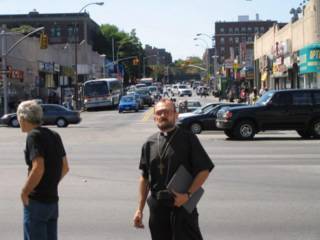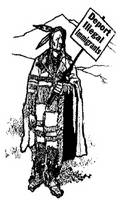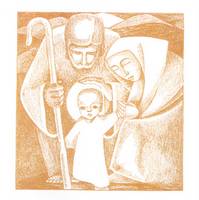Lenten Rules of Fast and Abstinence
The most important Lenten rule is a Prayerful spirit! Fasting is all about remembering -- to pray. Fasting is NOT a Lenten sacrifice. We fast ONLY to pray better. "Hunger pains" help purify our spirits and make it better attuned to God rather then ourselves.
To gauge the sincerity and spiritual value of your Lent, make an examination of conscience. Then ask God to give you the strength to do that which would be most pleasing to Him and best for you. It's like tuning your spark plugs which gets you back on track again.
Even the devil's demons and minions fast. Many do. Some make a big display of keeping all the laws of the Church while they "secretly" sin or debase themselves. They look impressive and religious in their finery and sound quite holy with their prayerful words -- all while fasting and abstaining during Lent. Yes, even devil's fast. They do so to their own condemnation. And many good people fast while distracting themselves from the effort by indulging in favorite activities. So it's HOW one fasts that matters. Fasting from food while feasting on mortal lusts is counter-indicated, contradictory -- and a waste of time.
Fasting and abstaining is null, void and empty UNLESS it prompts us to pray more. It's intended to remind us to humble ourselves, to serve others and to forgive. Unless fasting leads us to Church and the sacraments of Penance and Holy Eucharist more often then it is a waste of time.
It must be a secret thing between you and God. Don't brag about or even mention your fasting. How you do it and even IF you do it is a personal matter between you and God.
Fasting impels us to give alms to the poor and to wash their feet. Did you hug a "leper" today (for him or her, not for your sake)? Would you? Can you? Can you recognize Christ in the very least of our brothers? -- the ones we skeeve and would sooner spit on; the ones in lock-ups, the ones who hurt us. Fasting reminds us to pray for them -- ALL of them -- and then to pray for ourselves that God will perfect our own inner flaws and failings.
If we fast and abstain only because it is Church Law then you are wasting your time. Unless these laws are helping you grow in your dialogue with God and relationship with His Church -- then they are not working for you or Him. If you need guidance or advice then seek professional spiritual help. Your clergy are physicians of souls. Get yours cleaned and healed this Lent for the sake of your eternity.
ABSTINENCE:
1. Everyone over seven years of age (all over 14 in the New Rite) is bound to observe the law of Abstinence which affects only the kind of food, and has no reference to its quantity unless it is also a day of Fast. Catholics are also to perform penance on all Fridays of the year.
2. Complete Abstinence, which forbids the eating of any flesh meat (the meat from warm blooded land animals which includes birds and fowl), and soup or gravy made from meat, is required on all Fridays -- not including Holy Days (ONLY on Ash Wednesday and Good Friday in the New Rite), Ash Wednesday, Holy Saturday, the Vigil of the Assumption, and the Vigil of Christmas*. Fish, snails, frogs, oysters, shrimp, crabs, turtles, etc. may be eaten on days of abstinence. Abstinence does NOT (as it had in former times and still does in Orthodoxy) forbid the taking of eggs or milk products for nourishment.
3. Partial Abstinence, which permits meat, to be eaten only once a day, at the principal meal, is required on Ember Wednesdays, Ember Saturdays, and the Vigil of Pentecost.
FASTING:
1. Everyone ages 21-59, having completed their twenty-first (18th in the New Rite) to the beginning of their sixtieth year inclusive, is also bound to observe the laws of Fast unless health or other sufficient reasons allow for a dispensation.
2. The days of Fast are all the weekdays of Lent (except Sundays and the Wednesday of Holy Week), the Ember Days, the Vigil of Pentecost, the Vigil of the Assumption, and the Vigil of Christmas.
(Lenten Fridays in the Novus Ordo are days of abstinence -- not fast. Their only days of fast are Ash Wednesday & Good Friday. The late John Cardinal O'Connor wanted to reinstitute ALL Fridays of the year as day of abstinence from meat to do collective penance for the sins of abortion. Cardinal Egan supported that proposal but it has not officially gone anywhere.)
3. On the days of Fast only one full meal is allowed. Two other meatless meals, sufficient to maintain strength, may be taken according to each one’s needs, but together they should not equal another full meal. Eating “snacks” between meals is forbidden on days of Fast
4. Meat MAY be taken at the principal meal on a day of Fast except on those of Abstinence.
5. Eating between meals is not permitted, but liquids which are not nourishing (i.e., wine, soda, milk, tea, lemonade and black coffee, etc.) is permitted. (Fruit Juice is also allowed in the New Rite.)
6. When health, a necessary long journey or ability to work would be seriously affected, the law does NOT oblige. In doubts concerning Fast or Abstinence, a Traditional Catholic priest or confessor should be consulted.
7. There is no obligation of Fast or Abstinence on any Holy Day of Obligation, even though it may fall on a Friday.
* Marriages are NOT solemnized from the First Sunday in Advent until Christmas, and from Ash Wednesday until Holy Pascha (Easter Sunday).
FAST AND ABSTINENCE: The days of Fast and Abstinence are Ash Wednesday, the Wednesdays and Fridays of Lent (except Wednesday of Holy Week), the forenoon of Holy Saturday, the vigils of Christmas, Pentecost, Assumption, and All Saints; and the various Ember Days.
EMBER DAYS: The Ember Days (a.k.a. Quarter Tenses, from the Latin Quatuor Tempora, meaning the four times) occur at intervals of about three months. They are the Wednesday, Friday and Saturday following the 1.) First Sunday of Lent, 2.) Pentecost Sunday, 3.) the Third Sunday in September, and 4.) the Third Sunday of Advent. The Ember Days are days of fasting for the special sanctification of the four seasons and for obtaining God’s blessing on the clergy, for whose ordination the Ember Saturdays are especially set apart. The Propers of the Masses reflect the Season in which they occur and include additional Lessons said before the Epistle.































































0 Comments:
Post a Comment
<< Home